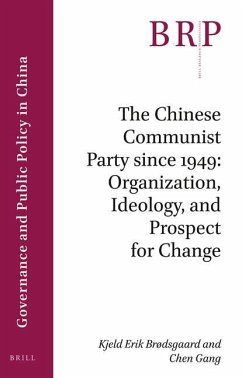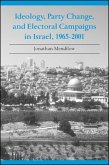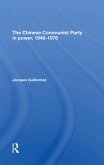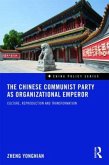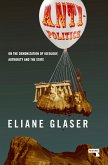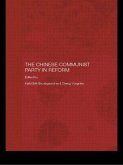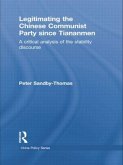Kjeld Erik Brodsgaard, Chen Gang
The Chinese Communist Party Since 1949: Organization, Ideology, and Prospect for Change
Kjeld Erik Brodsgaard, Chen Gang
The Chinese Communist Party Since 1949: Organization, Ideology, and Prospect for Change
- Broschiertes Buch
- Merkliste
- Auf die Merkliste
- Bewerten Bewerten
- Teilen
- Produkt teilen
- Produkterinnerung
- Produkterinnerung
This study is intent on depicting major aspects concerning the Chinese Communist Party's (CCP) organizational arrangement and explaining some key concepts in the ideological framework constructed by the CCP leadership over time.
Andere Kunden interessierten sich auch für
![Ideology, Party Change, and Electoral Campaigns in Israel, 1965-2001 Ideology, Party Change, and Electoral Campaigns in Israel, 1965-2001]() Jonathan MendilowIdeology, Party Change, and Electoral Campaigns in Israel, 1965-200143,99 €
Jonathan MendilowIdeology, Party Change, and Electoral Campaigns in Israel, 1965-200143,99 €![The Chinese Communist Party in Power, 19491976 The Chinese Communist Party in Power, 19491976]() Jacques GuillermazThe Chinese Communist Party in Power, 1949197657,99 €
Jacques GuillermazThe Chinese Communist Party in Power, 1949197657,99 €![Ideology, Legitimacy and the New State Ideology, Legitimacy and the New State]() Sinisa MalesevicIdeology, Legitimacy and the New State66,99 €
Sinisa MalesevicIdeology, Legitimacy and the New State66,99 €![The Chinese Communist Party as Organizational Emperor The Chinese Communist Party as Organizational Emperor]() Zheng YongnianThe Chinese Communist Party as Organizational Emperor80,99 €
Zheng YongnianThe Chinese Communist Party as Organizational Emperor80,99 €![Anti-Politics: On the Demonization of Ideology, Authority and the State Anti-Politics: On the Demonization of Ideology, Authority and the State]() Eliane GlaserAnti-Politics: On the Demonization of Ideology, Authority and the State14,99 €
Eliane GlaserAnti-Politics: On the Demonization of Ideology, Authority and the State14,99 €![The Chinese Communist Party in Reform The Chinese Communist Party in Reform]() The Chinese Communist Party in Reform71,99 €
The Chinese Communist Party in Reform71,99 €![Legitimating the Chinese Communist Party Since Tiananmen Legitimating the Chinese Communist Party Since Tiananmen]() Peter Sandby-ThomasLegitimating the Chinese Communist Party Since Tiananmen62,99 €
Peter Sandby-ThomasLegitimating the Chinese Communist Party Since Tiananmen62,99 €-
-
-
This study is intent on depicting major aspects concerning the Chinese Communist Party's (CCP) organizational arrangement and explaining some key concepts in the ideological framework constructed by the CCP leadership over time.
Hinweis: Dieser Artikel kann nur an eine deutsche Lieferadresse ausgeliefert werden.
Hinweis: Dieser Artikel kann nur an eine deutsche Lieferadresse ausgeliefert werden.
Produktdetails
- Produktdetails
- Verlag: Brill
- Seitenzahl: 66
- Erscheinungstermin: 26. September 2019
- Englisch
- Abmessung: 231mm x 150mm x 8mm
- Gewicht: 68g
- ISBN-13: 9789004417892
- ISBN-10: 9004417893
- Artikelnr.: 58040724
- Herstellerkennzeichnung
- Produktsicherheitsverantwortliche/r
- Europaallee 1
- 36244 Bad Hersfeld
- gpsr@libri.de
- Verlag: Brill
- Seitenzahl: 66
- Erscheinungstermin: 26. September 2019
- Englisch
- Abmessung: 231mm x 150mm x 8mm
- Gewicht: 68g
- ISBN-13: 9789004417892
- ISBN-10: 9004417893
- Artikelnr.: 58040724
- Herstellerkennzeichnung
- Produktsicherheitsverantwortliche/r
- Europaallee 1
- 36244 Bad Hersfeld
- gpsr@libri.de
Kjeld Erik Brødsgaard is Professor at the Department of International Economics, Government and Business and Director of the China Studies programme at the Copenhagen Business School, teaching courses on comparing societies and economic systems, Asian political economy, and international business and politics with a focus on China. His most recent books include From Accelerated Accumulation to Socialist Market Economy in China: Economic Discourse and Development From 1953 to the Present (2017); Critical Reading on the Chinese Communist Party, 4 vols. (2017); Chinese Politics as Fragmented Authoritarianism: Earthquakes, Energy and Environment (2016); Hainan - State, Society, and Business in a Chinese Province (2009 and 2013); The Chinese Communist Party in Reform (with Zheng Yongnian, 2006); and Kina I Moderne Tid - Samfund, Økonomi, og Politik (Modern China - Society, Economy and Politics (in Danish, 2019). Professor Brødsgaard has held visiting research appointments in China, Hong Kong, Singapore, Taiwan and the USA. He is, among others, member of the International Advisory Board of the East Asian Institute, National University of Singapore; member of the Board of Sino-Danish University Centre for Education and Research; member of the Board of Directors, the Danish-Chinese Business Forum; and a trustee of the Cambridge China Development Trust. He is also a Non-resident Senior Fellow at the Nordic Institute of Asian Studies (NIAS) and an Honorary Research Fellow at the Research Centre for Contemporary China, School of Government, Peking University. His current research covers state-Party-business relations in China; the nomenklatura system and cadre management; SOE reform; and the rise of Chinese supermanagers. He holds a PhD from the Department of Asian Studies, University of Copenhagen, having completed his undergraduate studies at the University of Aarhus and his Masters program at the University of Copenhagen. He first visited China as an exchange student in 1978-1979 and continues to visit each year. Chen Gang is Assistant Director and Senior Research Fellow of the East Asian Institute (EAI), National University of Singapore. Since he joined the EAI in 2007, he has been tracing China's politics, foreign policy, environmental and energy policies and publishing extensively on these issues. He is the single author of Politics of Renewable Energy in China (Cheltenham, UK: Edward Elgar, 2019), The Politics of Disaster Management in China: Institutions, Interest Groups, and Social Participation (New York: Palgrave Macmillan, 2016), China's Climate Policy (London and New York: Routledge, 2012), and Politics of China's Environmental Protection: Problems and Progress (Singapore: World Scientific, 2009). He provides consultancy for the Singapore government on policy issues in East Asia. He is frequently interviewed by media like Voice of America, Bloomberg TV, BBC, Channel NewsAsia and Xinhua News Agency. He sometimes gives lectures at the Lee Kuan Yew School of Public Policy of the National University of Singapore, the Ministry of Foreign Affairs of Singapore, and Singapore Environment Institute. He helps the Lee Kuan Yew School of Public Policy to design the "Public Sector Risk Management" curriculum for MPA students.

